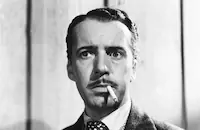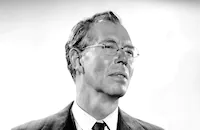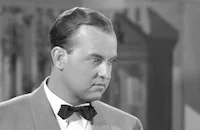Dragonwyck

Brief Synopsis
Cast & Crew
Joseph L. Mankiewicz
Gene Tierney
Walter Huston
Vincent Price
Glenn Langan
Anne Revere
Film Details
Technical Specs

Synopsis
In 1844, lovely, young Miranda Wells lives on a farm near Greenwich, Connecticut and often escapes her mundane existence through daydreams of a romantic, luxury-filled life. Miranda is thrilled when her mother Abigail receives a letter from Nicholas Van Ryn, a distant cousin whose extensive lands and mansion, Dragonwyck, are the envy of his fellow Hudson River landholders. Abigail explains to Miranda that Nicholas is descended from the original Dutch patroons, but despite his wealth, she is wary of his request that one of her daughters serve as governess to his eight-year-old daughter Katrine. Miranda's religious father Ephraim is opposed to the idea, until Miranda shows him a Bible passage that convinces him. Soon after, Ephraim and Miranda meet Nicholas, who passes Ephraim's inspection despite his arrogant attitudes toward the tenant farmers working the Van Ryn lands. Upon reaching Dragonwyck, Nicholas introduces Miranda, with whom he has shared an instant attraction, to Katrine and Johanna, his gluttonous wife. One afternoon, Miranda and Katrine hide in the woods to watch the kermess, an annual ceremony at which Nicholas receives the rents of his tenants, and are discovered by Dr. Jeff Turner. Jeff expresses interest in seeing Miranda again, but warns her that he dislikes Nicholas, whose autocratic policies are antipathetic to his own democratic principles. At the kermess, farmer Klaas Bleeker asserts that his family has paid Nicholas the value of their land many times over and refuses to pay more rent. Nicholas then evicts him, after which Jeff prevents Klaas from attacking Nicholas, while continuing to defend Klaas's political position. At a ball hosted by Nicholas that evening, some of the high society guests snub Miranda due to her humble background. Soon after, Jeff comes to Dragonwyck to ask for help in defending Klass, who has been falsely accused of murder. Nicholas is disinterested at first but then promises to help and asks Jeff to examine Johanna, who has a head cold. Jeff assures her that the cold will pass, then joins Miranda for dinner, while Nicholas, who has brought his favorite oleander plant to Johanna's room to cheer her, stays to give her some cake. Later that night, Johanna dies suddenly, much to Jeff's astonishment. Nicholas meets Miranda downstairs and tells her that he was never happy with Johanna, who could not bear him a much longed-for son. Miranda can no longer fight her feelings either and the couple admit their love, although Miranda returns to Connecticut the next day. At the farm, Ephraim is irritated by Miranda's distant behavior, but her reserve is explained two months later when Nicholas arrives to ask for her hand in marriage. Ephraim and Abigail reluctantly consent, and a few months later, Nicholas is away on business when Miranda discovers that she is pregnant. Despite their quarrels over Nicholas' lack of religious faith and his fury over Miranda's hiring of a lame maid, Peggy O'Malley, Nicholas is thrilled by the news. Nicholas' joy is tempered by new laws permitting tenant farmers to buy their lands, but despite the threat to his historic rights, he anticipates passing Dragonwyck on to the baby, who he is sure will be a son. Nicholas asks Jeff to attend Miranda when she gives birth, and although Jeff is pleased to see Miranda, whom he still loves, he must tell her that her newborn son has a defective heart. Miranda has the baby baptized before he dies, but Nicholas is enraged and heartbroken by his son's death. As the months pass, Nicholas grows more distant and embittered, and informs Miranda that he has become a drug addict. Fearing for her mistress' life, Peggy begs Jeff for help and reveals that Nicholas has brought the oleander plant to Miranda's room. Jeff rushes to Dragonwyck and there accuses Nicholas of poisoning Johanna with oleander and attempting to do the same to Miranda. Much to Miranda's horror, Nicholas admits his crime and begins to fight with Jeff. Nicholas is knocked out during the struggle, but after Jeff and Miranda leave, the addled Nicholas staggers to the kermess grounds and calls for the farmers to bring their tributes. As Nicholas waves his pistol, the farmers assemble with Jeff, Miranda, the mayor and sheriff, and Nicholas is shot when he takes aim at Jeff. The farmers doff their caps as Nicholas dies, and later, Miranda prepares to return to Greenwich, which she now realizes is her true home. Jeff bids her farewell and promises to visit her the following week.

Director

Joseph L. Mankiewicz
Cast

Gene Tierney

Walter Huston

Vincent Price
Glenn Langan

Anne Revere

Spring Byington

Connie Marshall

Henry Morgan

Vivienne Osborne

Jessica Tandy
Trudy Marshall
Reinhold Schunzel

Jane Nigh
Ruth Ford
Scott Elliott

Boyd Irwin
Keith Hitchcock
Maya Van Horn
Francis Pierlot
Arthur Thompson
Al Winter
Larry Steers
Wallace Dean
Tom Martin
Edwin Davis
Shelby Bacon
Ruth Cherrington
Elizabeth Williams
John Chollot
Nenette Vallon
Virginia Lindley
Mickey Roth
Jaime Dana
Robert "buzz" Henry
Dudley Dickerson
J. Louis Johnson

Walter Baldwin
Harry Humphrey
Robert Malcolm
Clancy Cooper
Trevor Bardette
Arthur Aylsworth
Tom Fadden

Addison Richards
Jane Porter
Betty Fairfax
Michael Garrison

Grady Sutton
Walter Tetley
Buddy Gorman

Gertrude Astor
Charles Waldron
Steve Olsen
Douglas Wood
George Ford
Alexander Sacha
Nestor Eristoff
Ted Jordan
William Carter
Crew
Charles Althouse
Arthur Appel
W. D. Flick
Paul S. Fox
Lorry Haddock
Sol Halprin
Ralph O. Hammeras
Roger Heman
Renè Hubert
Johnny Johnson
Katherine Lambert
Thomas Little
Paul Lockwood
A. E. Lombardi
Ernst Lubitsch
Joseph L. Mankiewicz
Arthur Miller
Paul Neal
Alfred Newman
Ben Nye
Arthur Pierson
Edward B. Powell
Frances C. Richardson
Fred Sersen
Dorothy Spencer
Russell Spencer
Murray Spivack
J. O. Taylor
Lyle Wheeler
Darryl F. Zanuck

Photo Collections
Film Details
Technical Specs

Articles
Dragonwyck
Synopsis: In 1844, proud Connecticut farmer Ephraim Wells (Walter Huston) and his wife Abigail (Anne Revere) receive a message from their distant relative Nicholas Van Ryn (Vincent Price). Van Ryn is a wealthy landowner living on a huge estate called Dragonwyck, located in the Hudson Valley in New York. He asks Wells if one of his daughters would consent to live at Dragonwyck and care for eight-year-old Katrine (Connie Marshall), the daughter of Van Ryn and his wife Johanna (Vivienne Osborne). One of Wells' daughters, Miranda (Gene Tierney), is restless and feels suffocated by her strict upbringing and mundane surroundings; she is all too anxious to be sent to the estate. Nicholas Van Ryn proves to be an imposing, arrogant figure; he is from a long line of Dutch patroons, and he lords over the tenant farmers that work his land. Van Ryn's wife is a gluttonous, spiteful woman, while daughter Katrine worries and hears the presence of long-dead Van Ryns in the house. Miranda falls in love with Van Ryn, who expresses his displeasure that his wife cannot bear him a son. Miranda eventually meets Dr. Jeff Turner (Glenn Langan), who despises Van Ryn's treatment of the tenant farmers. Nevertheless, Turner arrives at Dragonwyck to treat Johanna for cold symptoms; he is amazed, and begins to fear for Miranda's safety, when Van Ryn's wife suddenly dies.
Joseph L. Mankiewicz began his career in the movie industry in 1929, but it took seventeen years until he was in a position to direct his first film. Mankiewicz started as a writer, first penning title cards for silent pictures, but he was soon turning out screenplays for such diverse movies as Skippy (1931), Million Dollar Legs (1932), Alice in Wonderland (1933), and Manhattan Melodrama (1934). He shifted gears in the early 1940s at the request of Louis B. Mayer, and became a producer at MGM with such high-profile films as Strange Cargo, The Philadelphia Story (both 1940), and Woman of the Year (1942), in which he was the first to team Spencer Tracy and Katharine Hepburn.
Mankiewicz arrived at 20th Century Fox as a writer-producer eager to become a triple-threat talent by adding directing to his resume. He got his chance in a roundabout fashion following his production of The Keys of the Kingdom (1944), co-written with Nunnally Johnson and starring Gregory Peck and Vincent Price. Fox chief Darryl F. Zanuck purchased the film rights for the Anya Seton novel Dragonwyck while it was still being serialized in Ladies' Home Journal. Mankiewicz "covered" the story for the studio ("cover" being Hollywood lingo for the process of evaluating a pre-existing property for its potential in being adapted for the screen). In his book on the writer/director, Bernard F. Dick reported that "...he wrote that there was 'less... than meets the eye,' calling Seton's knowledge of politics 'naïve, oversimple.' Yet he begrudgingly admitted that 'the opportunities for production values are exciting.'" Zanuck assigned the film to another recent arrival at Fox, the celebrated filmmaker Ernst Lubitsch. Lubitsch had signed a director/producer contract with Fox in 1943, but soon after suffered a major heart attack which curtailed his activities severely. Lubitsch chose Mankiewicz to direct.
Mankiewicz is to be admired for attempting to infuse Dragonwyck, at heart a derivative Gothic potboiler, with some interesting observations on class consciousness and for allowing Vincent Price to express the moody villainy that would later serve him so well in the cycle of Poe films directed by Roger Corman in the 1960s. In his analysis of the film, Bernard F. Dick felt that Mankiewicz' emphasis on the social ideas of the story threw the film out of balance, writing that "...the main difficulty was the novel itself. Mankiewicz had two choices in adapting it: he could emphasize the gothic elements (gloomy mansion, lunatic husband, terrorized wife), minimizing or deleting the social and ideological ones; or he could make the clash of the classes (patroon and tenant farmers) and their respective ideologies (autocracy/democracy) the film's axis, weaving the gothic strands around it. Mankiewicz did both; the gothic lost, democracy won." It is difficult to see how Dick came to the conclusion that the gothic elements were pushed to the background, though; Price's emphatic performance alone assured that gloom and mania were at the forefront in Dragonwyck.
Van Ryn, in fact, eventually becomes the central character of the film, and is played with a surprising sense of humor, or at least biting sarcasm. When Johanna asks what he could possibly be doing up in the private tower room, Van Ryn replies, "Anything from pinning butterflies to hiding an insane twin brother." In her book Vincent Price: A Daughter's Biography, Victoria Price recounts the difficulty her father had in getting the role: "...having made such a success of the villain in Angel Street [Patrick Hamilton's 1941 Broadway play], he was convinced that to play a similar role on screen would be a great boost to his career. But first he had to convince Mankiewicz and the studio heads. This was not that easy. 'I had to fight like the devil for this part. My bosses kept remembering me as the good-natured guy in Laura (1944) and I insisted I wasn't that type.' Furthermore, Mankiewicz, who had produced The Keys of the Kingdom, could only think of Vincent as the portly prelate he had played in that film a long shot from the tall, dark, handsome Van Ryn that he had in mind. Determined to convince Mankiewicz, Vincent lost all the weight he had gained, auditioned, and won the coveted role."
The script for Dragonwyck encountered a few censorship problems. The use of Oleander as a murder weapon proved problematic because the Production Code Administration always forbid the depiction of details when it came to fashioning a poison or other elaborate killing method, for fear of audience members running out of the theater and acting on what they have seen. In their notes, the PCA said, "because of the prevalence of Oleander in this country, and as a detail of crime which could be easily imitated, we must ask that this dialogue referring to being poisoned by Oleander be rewritten in such a way as to confuse the method." The revelation that Nicholas was addicted to opium also had to be obscured. In the final film he admits to being a drug addict, but no specific drug is mentioned or in evidence in Nicholas' private room. In another scene cut from the final film, Van Ryn spoke at Dragonwyck with a French Count played by John Chollot, discussing life and death, culminating in a diatribe against science. Lubitsch felt that the scene was very important, and when it was cut he asked Zanuck to have his name removed from the credits. (Indeed, Dragonwyck has no producer credit, which is very unusual for a studio film from the period).
Variety called Dragonwyck "lucid, often-compelling," and said the film was "...always brooding with never a break in its flow of morbidity. ...[The] mood and atmosphere of the film are grim and shivery enough so to give it a ready audience among the horror film fans." In the New York Times, Bosley Crowther said that, in spite of the horror elements, "...there is so much talk in the script and so little motion in the action that the tale rather tediously unfolds. The demon inflexibility of the master is barely explained, and a sketchy suggestion of class warfare between the landlord and his tenants is soon dropped. Mr. Mankiewicz and his associates have done the whole thing so ponderously that they have drained it of electric essence, and even of the element of surprise." Crowther had praise for Price's performance, though, writing that "...his moments of suave diabolism are about the best in the film."
Producer: Ernst Lubitsch, Darryl F. Zanuck (both uncredited)
Director: Joseph L. Mankiewicz
Screenplay: Joseph L. Mankiewicz, based on a novel by Anya Seton
Cinematography: Arthur Miller
Art Direction: Russell Spencer, Lyle Wheeler
Music: Alfred Newman
Film Editing: Dorothy Spencer
Cast: Gene Tierney (Miranda Wells), Walter Huston (Ephraim Wells), Vincent Price (Nicholas Van Ryn), Glenn Langan (Dr. Jeff Turner), Anne Revere (Abigail Wells), Spring Byington (Magda), Connie Marshall (Katrine Van Ryn), Henry Morgan (Klaus Bleecker), Vivienne Osborne (Johanna Van Ryn), Jessica Tandy (Peggy O'Malley), Trudy Marshall (Elizabeth Van Borden)
BW-103m.
by John M. Miller

Dragonwyck
Quotes
But there's everything here you could possibly want!- Miranda Wells
Everything is what no man should ever want.- Ephraim Wells
What can you possibly do up there?- Johanna Van Ryn
Possibly? Anything from pinning butterflies to hiding an insane twin brother. Actually, I read. I hope that my explanation satisfies you?- Nicholas Van Ryn
But I will not live by ordinary standards. I will not run with the pack. I will not be chained into a routine of living which is the same for others. I will not look to the ground and move on the ground with the rest: so long as there are those mountaintops, and clouds, and limitless space.- Nicholas Van Ryn
Trivia
Ernst Lubitsch was intended to direct the film. When he suffered from illness, Joseph L. Mankiewicz took over.
Notes
Anya Seton's novel was first published in Ladies Home Journal between August and December 1943. According to a June 6, 1944 Hollywood Reporter news item, Gregory Peck was first considered for the "co-star role" of this picture, and a modern source reveals that studio production chief Darryl F. Zanuck intended to feature Peck as "Nicholas" and John Hodiak as "Dr. Jeff Turner." Hollywood Reporter production charts indicate that Michael Francis and then William Eythe were assigned to play "Dr. Jeff Turner." According to a April 4, 1945 Hollywood Reporter news item, actor Albert Van Antwerp suffered a heart attack and was replaced by Addison Richards, and actor Alec Craig was replaced by Walter Baldwin when Craig became ill with influenza. A April 20, 1945 Hollywood Reporter news item includes Stuart Holmes in the cast, but his appearance in the completed picture has not been confirmed. Some scenes in the film were shot at Sherwood Forest, CA.
Information in the MPAA/PCA Collection at the AMPAS Library discloses that the film was originally to end with a fire in which "Nicholas" died. The Breen Office ordered that the sequence be changed, however, to avoid any implication that "Nicholas" committed suicide "in order to escape justice." [A March 4, 1945 New York Times article stated that the ending was changed by studio officials due to its resemblance to previous films Rebecca and Jane Eyre.] The PCA also discouraged "showing Nicholas resorting to opium as an escape." Although "Nicholas" clearly states that he is a drug addict in the finished film, he does not indicate to which drug he is addicted. The PCA also advised: "Because of the prevalence of Oleander in this country, and as a detail of crime which could be easily imitated, we must ask that this dialogue referring to being poisoned by Oleander be rewritten in such a way as to confuse the method."
Numerous pre-release sources credit Ernst Lubitsch as the producer of the film. According to a modern source, Lubitsch withdrew from the project due to his poor health and conflicts with director and screenwriter Joseph L. Mankiewicz. Dragonwyck marked Mankiewicz' first directorial effort. Another modern source states that Lubitsch demanded the removal of his name as producer after Zanuck ordered the elimination of one of his favorite sequences, in which "Nicholas" discusses his philosophy of life. The Twentieth Century-Fox Records of the Legal Department, located at the UCLA Arts-Special Collections Library, contain an December 11, 1945 letter from Lubitsch to the studio requesting "that no screen or advertising credit be given me in connection with the motion picture Dragonwyck." Some reviews credit Zanuck as the film's producer.















